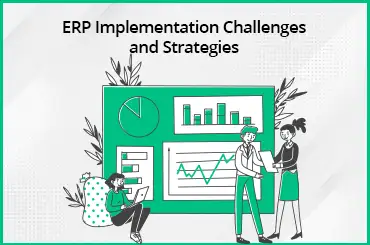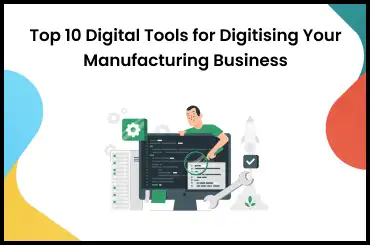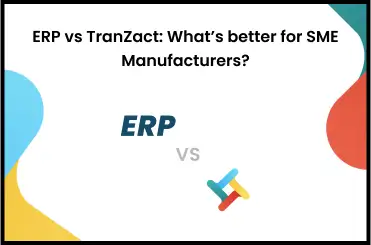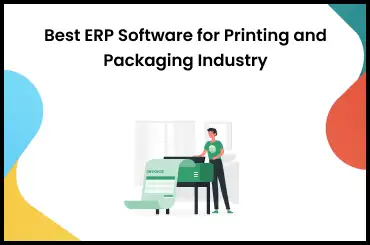Corporate Performance Management (CPM) is a way to help businesses plan, monitor, and manage their performance to reach their goals.
It involves using tools to figure out what needs to be done, making sure resources are used well, and watching important measures to make smart choices. This way, businesses can work better and grow steadily.
What Is Corporate Performance?
Corporate performance refers to a company's effectiveness in achieving its goals.
It involves the combination of:
- Various processes
- Methods
- Technologies
It involves assessing financial and Non-financial measures to measure
- Profitability
- Growth
- Efficiency
- Customer satisfaction
- Competitiveness.
Effective corporate performance management enables informed decision-making, resource use, and sustainable growth.
What Is Corporate Performance Management (CPM)?
Corporate performance management solutions are a strategic approach that helps organizations effectively plan, monitor, and manage their performance.
It involves integrating processes, methods, and technologies to measure, analyze, and optimize key performance measures across different departments.
Methodologies Employed In CPM
In Corporate Performance Management (CPM), many methods are used. These methods help businesses make decisions and effective plans. Some of them are:
1. Balanced Scorecard
This method looks at performance from many viewpoints, including money matters, internal processes, customer happiness, and learning and growth.
For eg: Think about a store. They look at the money they make, how smoothly things work inside, if customers are happy, and if the workers are learning and growing.
2. Key Performance Indicators
KPIs are measurable standards that track progress toward specific objectives. They provide measurable targets for performance evaluation and help identify areas for improvement.
For eg: In a computer game team. They aim to reply to player questions faster. They set a goal to answer within a day instead of two days. This helps them make players happier.
3. Performance Dashboards
Dashboards visually show current performance data, letting interested parties quickly understand how things are going.
For eg: Picture a chart on a screen. It shows how many people visit a website, how many click on things, and how many buy stuff. This helps the website owners understand how well things are going.
4. Comparing
Comparing involves comparing an organization's performance against industry peers or best practices.
For eg: One school looks at how well its students do on tests. But they also look at what other schools' students do to see if they can do better or need to improve.
How Is Corporate Performance Management Different From Human Performance Management?
Corporate Performance Management (CPM) and Human Performance Management (HPM) are two distinct approaches employed by organizations to enhance their overall performance.
Corporate Performance Management (CPM)
1. Focuses on managing and optimizing overall Business performance.
2. Encompasses activities, methods, and technologies for -
- Measuring
- Monitoring
- Improving performance across Departments
3. Involves strategic planning, goal setting, performance measurement, analysis, and decision-making at the Business level.
Human Performance Management (HPM)
1. Specifically concerned with managing and enhancing the performance of individual employees
2. Involves activities such as
- Performance appraisal
- Goal setting
- Skill development
- Feedback
- Coaching and Training
3. It focuses on improving individual performance and supporting employee growth and development.
Sources Of Metrics For Building CPM
When building Corporate Performance Management (CPM) plans, organizations depend on sources of metrics to evaluate their financial and operational performance. Some of them are:
1. Financial Statements
Financial statements offer valuable insights into revenue, profitability, liquidity ratios, and return on investment.
2. Operational Data
Operational data sources include production records, sales figures, inventory levels, and customer data, providing insights into work efficiency, customer satisfaction, and market performance.
3. Customer Feedback
Gathering customer feedback through surveys, feedback forms, or online reviews helps measure customer satisfaction and loyalty.
4. Industry Benchmarks
Comparing against industry peers or best practices provides external performance metrics for comparison.
Importance Of Corporate Performance Management Software
CPM software helps organizations reach their goals and improve performance. It helps in planning, budgeting, and decision-making for better efficiency.
1. Data Combination and Centralization
Corporate performance management software allows combining data from different sources, like financial systems, operational databases, and external data feeds.
2. Streamlined Performance Measurement
CPM software simplifies the process of defining and measuring key performance measures. It allows organizations to establish performance targets, track progress, and generate real-time reports and dashboards.
3. Enhanced Planning and Budgeting
CPM software helps the planning and budgeting process by providing tools for forecasting, and budget combination.
4. Performance Analysis and Reporting
Open-source corporate performance management software offers analytical capabilities, enabling in-depth performance analysis and reporting.
Benefits Of CPM
Businesses can make all the major important decisions with the help of CPM. Let us have a look at them in detail:
1. Improved Decision-Making
CPM gives businesses accurate and current data to help them make smart decisions. It also helps everything run smoother by putting data in one place and letting things happen automatically.
2. Enhanced Performance Measurement
CPM tools enable organizations to define and measure key performance measures aligned with their strategic goals. CPM tools make sure that everyone is focused on the right goals and working together to achieve them.
3. Increased Responsibility
CPM promotes responsibility by assigning ownership of KPIs and tracking performance against targets. This helps the whole team work together to get things done and reach the company's goals.
4. Efficient Reporting and Analysis
CPM tools automate the generation of reports and dashboards. This automation saves time and effort, allowing teams to focus on interpreting the insights and making informed choices for improvement.
Who Should Use Corporate Performance Management Tools?
Corporate Performance Management (CPM) tools are important for businesses and organizations of all sizes and industries These tools provide a structured way to check data, make informed decisions, and ensure that the company stays on track to achieve its objectives.
1. Executives and Senior Management
CPM tools enable executives to monitor business performance, track progress toward strategic goals, and make data-driven decisions.
2. Departmental Managers
CPM tools help departmental managers align their teams' performance with business objectives, track KPIs, and identify areas for improvement.
3. Finance and Accounting Professionals
The corporate performance management framework simplifies financial planning, budgeting, and reporting processes, improving accuracy and efficiency in financial management.
4. Operations and Supply Chain Managers
CPM tools provide insights into work efficiency, production metrics, and supply chain performance, helping improve processes and productivity.
What Are The Business Benefits Of Cloud-Based CPM Software?
Cloud-based CPM software offers businesses a lot of benefits. Those are:
1. Cost-Effectiveness
Cloud-based CPM software reduces the need for infrastructure investment and reduces IT maintenance costs.
2. Scalability and Flexibility
Cloud-based CPM software allows organizations to easily scale their usage based on their needs. The software can accommodate -
- Changes in data volume
- User base
- Functionality requirements.
3. Accessibility and Collaboration
Cloud-based CPM software can be accessed anytime, anywhere, with an internet connection. This enables:
- Collaboration with virtual teams in different locations
- Smooth communication
- Data Sharing
- Decision-making across departments and locations.
4. Data Security and Reliability
Cloud-based CPM software offers security measures and data backup agreements. Cloud service providers use advanced security measures including:
- Encryption
- Access controls
- Regular backups to ensure the safety and integrity of the business's performance data.
How To Avoid Corporate Performance Management Pitfalls
Cloud-based corporate performance management (CPM) software offers several business benefits that organizations can leverage.
1. Have clear goals
Make specific, measurable targets that everyone can understand and follow.
2. Involve everyone
Let all employees, managers, and leaders share their thoughts to make better decisions together.
3. Connect metrics to the plan
Use numbers that match the company's main goals so that everyone works in the same direction.
4. Use good data
Make sure the information you use is accurate and reliable by having rules for how it's managed.
5. Check often
Keep looking at the numbers regularly to see if they still make sense for the business.
How To Choose An Effective CPM Software Solution
You might get confused while choosing an effective CPM software solution. To help you with that, you can focus on the below-mentioned points for a better understanding:
1. Clear Goal Alignment
Ensure that performance goals and metrics are aligned with the organization's overall strategy and objectives.
2. Selecting Relevant and Meaningful Metrics
Choose metrics that truly reflect the organization's performance and align with strategic goals. Avoid overloading with many metrics that can lead to confusion and inefficiency.
3. Data Accuracy and Quality
Ensure the accuracy, consistency, and of data used for performance measurement with corporate performance management certification. Create rules for how data is managed, check if the data is correct, and put measures in place to make sure the data is reliable. This will help us trust the numbers we use.
4. Engage Interested parties
Involve key interested parties, including executives, managers, and employees, in the performance management process.
5. Continuous Monitoring and Feedback
Establish a system for regular performance monitoring and feedback. This allows for the timely identification of performance gaps and areas for improvement.
Simplify Your Corporate Performance Management with TranZact
Corporate performance management (CPM) is a strategic approach that helps organizations to effectively plan, monitor, and manage their performance to achieve business objectives.
To unlock the full potential of CPM, consider TranZact. With its features, user-friendly interface, and changing reporting capabilities, TranZact can simplify your performance management practices and drive business success.
FAQs On Corporate Performance Management
1. What is corporate performance?
Corporate performance refers to the evaluation of a company's effectiveness in achieving its goals and delivering value to interested parties.
2. How is corporate performance measured?
Corporate performance is measured through various financial and Non-financial related measures such as -
- Revenue growth
- Profitability
- Customer satisfaction
- Work efficiency
- Market share
3. Why is corporate performance important for businesses?
Corporate performance is crucial as it reflects the overall health and success of a business. It helps identify areas for improvement, optimize resource allocation, and drive strategic decision-making.
4. What are the key components of corporate performance?
The key components of corporate performance include
- Financial performance
- Operational performance
- Customer performance
- Employee performance
- Market performance.
5. How does corporate performance impact Business success?
Corporate performance directly impacts the organization's ability to achieve its objectives, meet stakeholder expectations, and sustain growth and profitability.
6. What strategies can organizations adopt to improve their corporate performance?
Organizations can improve corporate performance by setting clear goals, implementing performance measurement systems, and investing in employee development and engagement.

















